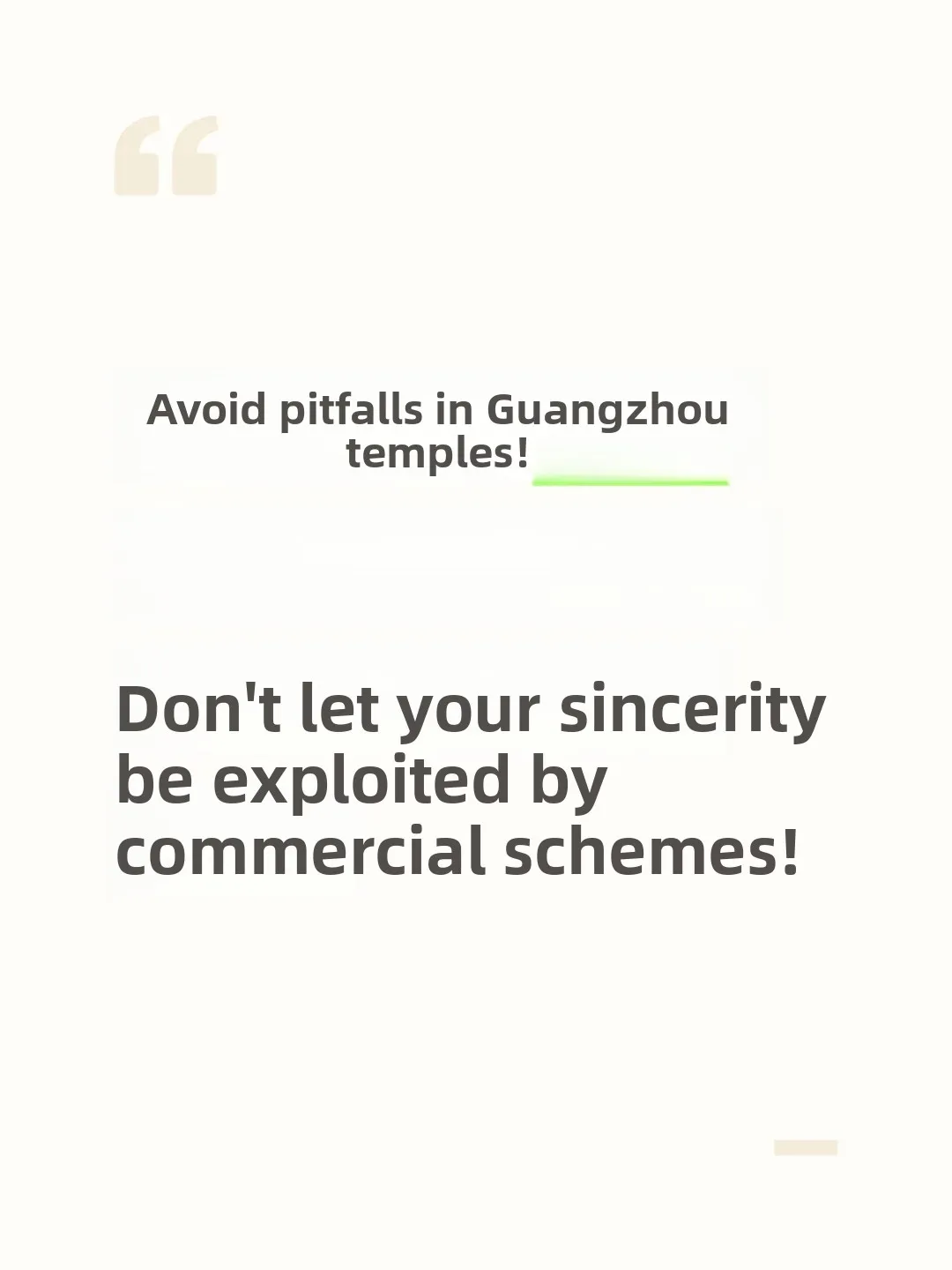Guangzhou Temple Alert: Don't Let Your Piety Pay for Their Profits!
-

Hey, everyone! Let's talk about the temples in Guangdong. The variety of temples there is so diverse.
-
The populous and heavily frequented "popular" temples:
- These temples are usually well-known with grand architectures, such as those named as "XX Great Buddha Temple" or ancient ones with rich history.
- Cultural Note: "A throng of incense lit" (xiānghuǒ wàng) refers to the fact that lots of people visit and offer incense for blessings. In China, this usually means the temple is believed to be powerful and effective, or very famous, leading to people being more willing to make donations (called "布施", bùshī), and thus, the temples can improve their facilities better but may get more commercialized too.
- Travel Experience:
- Inside, tourists are always bustling, with people taking pictures, burning incense, and consulting fortune-tellers. It can get quite lively.
- There'll also be many "supporting services": vendors selling incense materials, souvenirs, even some "masters" waiting to give you good advice (obviously, all for a price).
- Complaints & Avoidance Guide (Please Note!):
- Extremely Expensive Incense Materials/Souvenirs:
- Warning: The prices for incense or charm sellers near the entrance or inside the temple might shock you! Some might even suggest buying expensive items for it to be more effective.
- How to Avoid: Buddha watches our intentions rather than what we spend on the incense. Just be sincere and save unnecessary expenses. Many temples have free incense, or you can buy the cheapest joss sticks for just a few coins.
- Overly "attentive" guidance:
- Warning: Some people might enthusiastically direct you to where to burn expensive incense sticks, light costly lamps, or consult certain "masters".
- How to Avoid: Be cautious and politely refuse if it feels off. True spiritual cultivation and peace of mind comes from within, not by spending money.
- Night scene of old Great Buddha Temple: Some temples might look beautiful during nighttime with their lights but pay attention as they might introduce additional expenses due to the light show.
- These temples are usually well-known with grand architectures, such as those named as "XX Great Buddha Temple" or ancient ones with rich history.
-
The tranquil and anonymous "hidden" small temples:
- These temples may hide deep in the woods or in some inconspicuous corners without being known by many tourists.
- Cultural Note: "Place of Hardship Training" (kǔxiū zhī dì) refers to places where monks make great spiritual efforts under harsh conditions, paying more attention to their minds than materialism.
- Travel Experience:
- Inside, there may only be several monks who keep it quiet, letting you hear the birds and natural sounds.
- The surroundings may feel simple and slightly worn-out, but this helps people seek tranquility and distance themselves from worldly chaos.
- Here, "cultivating mind and body" (xiūxíng xiūxīn) feels more genuine as it pursues peacefulness and wisdom.
- Things to Note (Please Beware!):
- Respect for Quiet Cultivation:
- Warning: These places are dedicated spots for monks to undergo cultivation, not tourist attractions; loud disturbances or random photo-taking (especially at monks) are highly disrespectful.
- How to Avoid: Keep quiet and behave properly. Ask for permission before taking any photos.
- Material Support:
- Notice: If you sincerely want a way to support those hardworking monks, small donations (布施) would be a real help that they'd appreciate. There's usually a humble donation collection box.
- Inconvenient Accessibility: These small temples might face problems of accessibility, thus be prepared mentally and plan your schedule appropriately.
- Respect for Quiet Cultivation:
Thus, if you want to experience the hustle and bustle and admire impressive buildings, opt for those larger temples, but remember to guard your wallet tight, don't get tricked! Should you want to find a place for a peaceful mind, taste the real environment of profound cultivation, why not visit those less known small temples, just please keep respect at heart.
Which memorable temples have you visited in Guangdong? Share your stories, experiences, and avoidance tips here!
-
-
Perhaps Xihua Temple is the least commercialized one.
-
Are you here to advertise? I bet you don't even know the 'big boss' who calls the shots there.
-
In today's society, temples genuinely dedicated to spiritual practice usually don't struggle too much, unless they're not open to the public. People are generally very willing to support such places. If you find one that's open but still very run-down, I'd advise you to steer clear – there's bound to be a reason.
-
There's really no easy answer to your question. Famous temples are inevitably profit-driven and heavily commercialized. As for the truly serene, lesser-known temples, they're often not open to the public, so hardly anyone knows about them.
-
True devotion and spiritual practice aren't defined by whether a place is dilapidated or luxurious, nor even by whether it's a temple. If you have Buddha in your heart, you can practice anywhere. Even in the most worldly places, if one maintains a compassionate and enlightened mind, then divinity can be found everywhere.

-
There's a small temple in Xiguan Alley that's still quite tranquil for now. You'll see a few local folks sitting on the stone benches out front, just chatting. Please don't post about it on Xiaohongshu (XHS); once these places get popular there, they slowly become commercialized.
-
Where is it?
-
Can you even name a temple in downtown Guangzhou that isn't profit-oriented?
-
They're all run like businesses.
-
Go on then, which temple are you talking about?
-
Just offer three sincere bows, and that's what truly matters.
